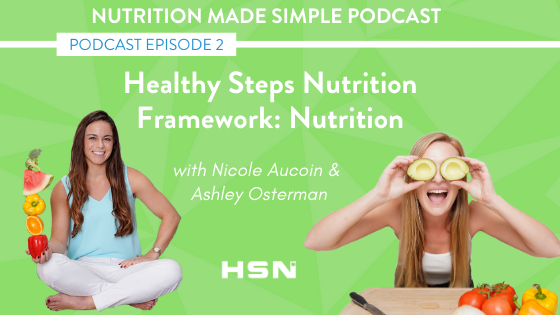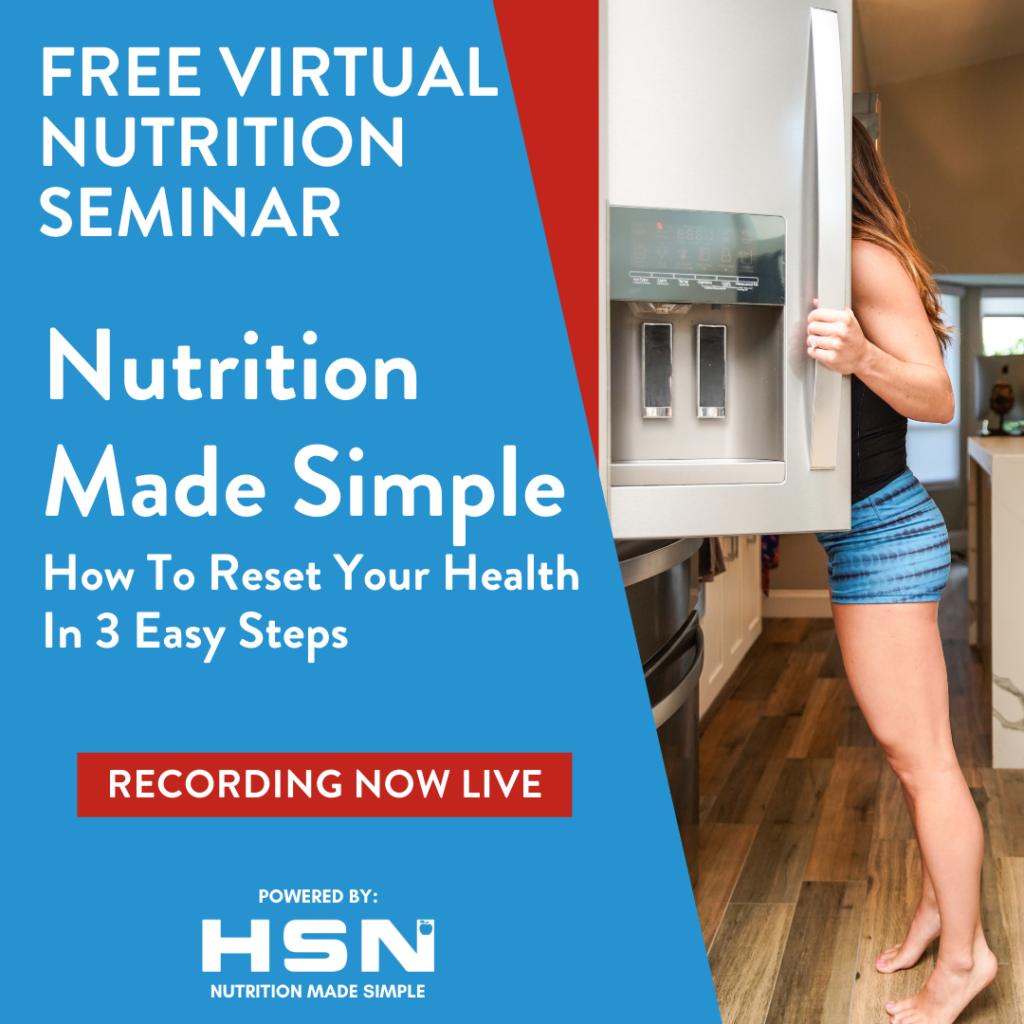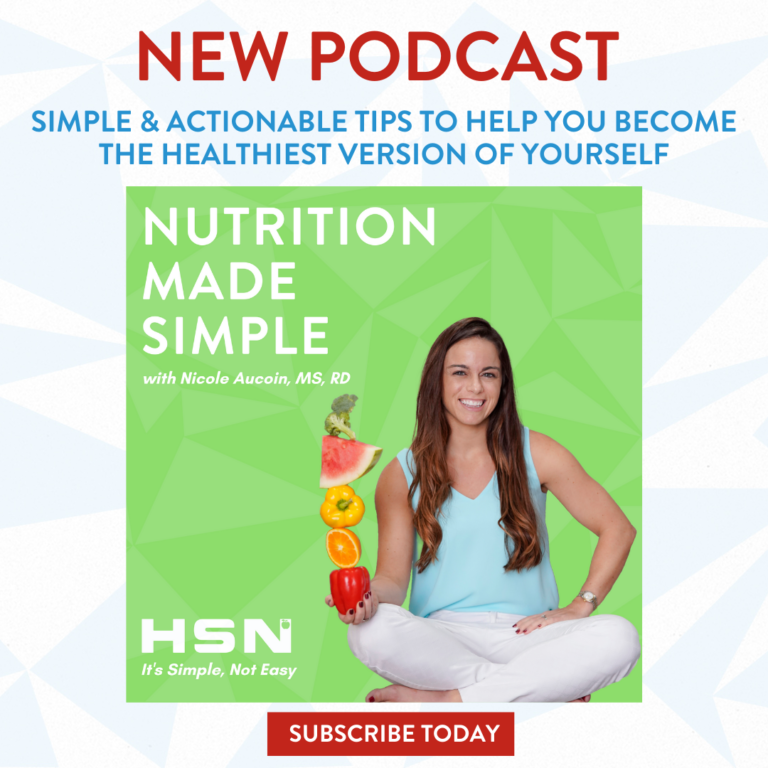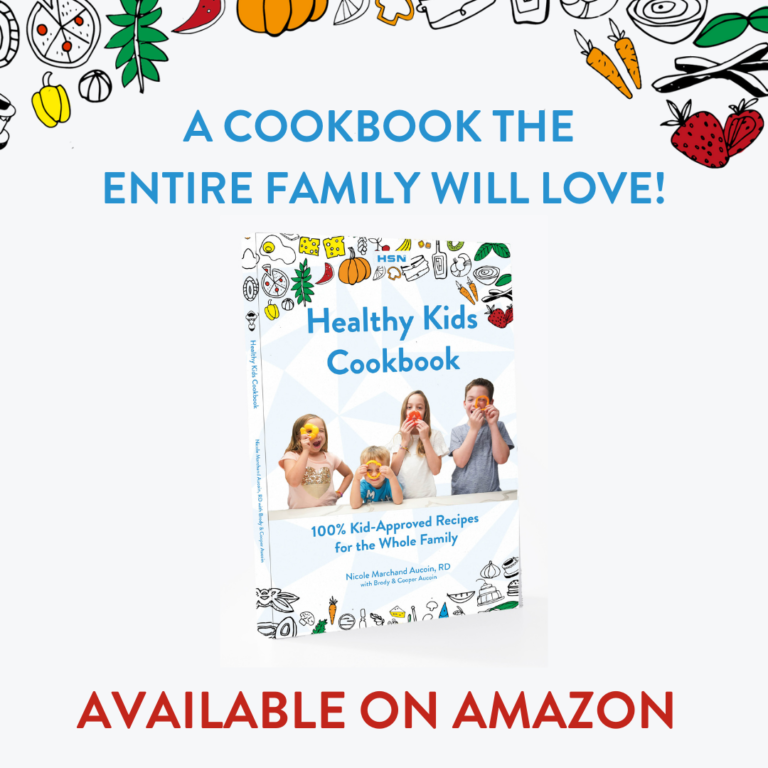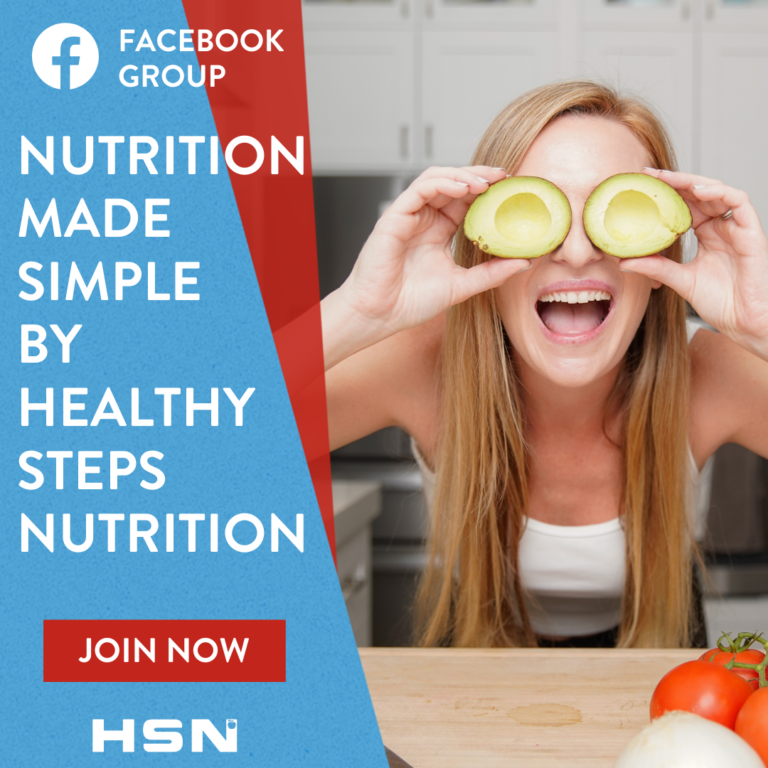Today, Nicole Aucoin and Ashley Osterman discuss the first section of the Healthy Steps Nutrition Framework: Nutrition.
They talk about ditching the all or nothing diet mentality and keeping it simple for success. Contrary to popular belief, you don’t need a diet; instead, you need a healthy lifestyle.
Learn how to understand and use the Nutrition Facts label >>here
PODCAST EPISODES TO LISTEN TO ON THE ADDITIONAL PILLARS OF THE HEALTHY STEPS NUTRITION FRAMEWORK
Episode Transcript:
Nicole Aucoin (00:04):
Welcome back to the Nutrition Made Simple podcast. At Healthy Steps Nutrition we believe something as fundamental as nutrition shouldn’t be complicated, which is why we focus on a simple habit-based approach when working with clients, I’m your host, Nicole Aucoin, registered dietitian and founder of Healthy Steps Nutrition, CrossFit HSN, and HSN Mentoring. I’m also the author of the Healthy Kids Cookbook, 100% kid approved recipes for the whole family. You can find that on Amazon. In this brand new podcast, I’m going to teach you how to take one step at a time to become the healthiest version of yourself. Today starts our first section of the Healthy Steps Nutrition Framework, nutrition.
Nicole Aucoin (00:52):
When I first started Healthy Steps Nutrition, honestly, this is what we focused on the most. And over the years, we’ve really come to understand that your weight loss journey is really 25% maybe nutrition, and the rest comes down to all the other factors; sleep, stress, support, lifestyle, exercise. You can’t have a restrictive diet that’s going to last forever. You really have to change your lifestyle, which means setting yourself up for success with all of the pillars in the Healthy Steps Nutrition framework.
Nicole Aucoin (01:25):
Two thirds of people will regain the weight that they worked so hard to lose. Over 60% of people make New Year’s resolutions, yet 80% of them fail by the second week of January. Why is that? Well, today’s episode we are going to tell you why. And it’s not your fault. We’re programmed and set up for failure by all this misinformation and marketing out there. So instead of having this all or nothing mindset, I want you to think about this episode and take one actionable step to help you become a healthier version of yourself. You have to rethink your nutrition, and I challenge you to rethink your goals and really focus on what we discuss in this episode. Enjoy.
Nicole Aucoin (02:17):
Welcome back to the Nutrition Made Simple podcast. Today we have Ashley Osterman, our head nutrition coach at Healthy Steps Nutrition and the director of nutrition education on to talk about the first pillar in the HSN framework, nutrition.
Ashley Osterman (02:33):
Nutrition, and this is such a broad topic, but when it comes to nutrition, I think it’s important to start off with the HSN nutrition philosophy.
Nicole Aucoin (02:44):
So what do we really focus on? I think at the very basis, let’s focus on whole foods. Let’s focus on real foods first and talk about balance. But in the coaching aspect, it’s focusing on one thing at a time to help our clients achieve lasting results.
Ashley Osterman (03:03):
Absolutely. At the very simplest form, eating meat, vegetables, nuts, and seeds, some fruit, little starch and no sugar, and really focusing on whole foods versus food products. And why is this important? Well, in 2020, the beverage and food industry in the United States is worth an estimated $1.8 trillion. And it’s projected to be worth $2.5 trillion by 2025.
Nicole Aucoin (03:36):
Here’s the problem. There’s so much misinformation out there about what is healthy, what is not healthy, what’s good for you, what’s marketed as good for you. And as you were just saying, the food and beverage, the weight loss industry being a trillion dollar industry, there’s a lot of money on the line for these companies. So they are doing a lot of really creative things to fool the public, to think this is healthy, and this is going to help you instead of hurt you.
Ashley Osterman (04:06):
Yes, they have the brightest minds that work with their marketing. And we find so many times that when people are struggling and thinking they’re doing what they’re supposed to do to reach their goal, that they’re really being fooled to eat processed foods marketed as healthy. And I see this a lot with working with our families and our kids.
Nicole Aucoin (04:27):
Kids marketing, it drives me crazy. Because you get a cereal box or an oatmeal box even, and it’s labeled as whole grains on the front. You’re like, “Oh yeah, this is awesome.” And then you bring it home. And this has even happened to us. My husband will bring home something and then I’m like, “How much sugar is in that food that you just bought?” And we turn it around and there’s two, three, four tablespoons, teaspoons of sugar in that food.
Ashley Osterman (04:57):
Yes. And you’re meant to think it’s a healthy option or alternative because of the buzzwords and the health claims and the marketing on these products. We see this so often and it’s no wonder why people are confused.
Nicole Aucoin (05:13):
So many people come to us frustrated. They’ve tried different diets and nothing has worked for them. When in reality, if we keep your nutrition plan as simple as possible so that you can stay consistent, because at the end of the day, the number one thing that successful nutrition clients have in common is that they’re consistent.
Ashley Osterman (05:34):
Yes, absolutely. And one great place to start, if you’re listening, is to try to incorporate more whole foods. Get those whole foods and make food at home instead of buying processed food. That’s a really great first step to start. And second, learn how to read nutrition facts labels. Just because there’s a claim that’s flashy and bright on the front of a package of a food product doesn’t necessarily mean it’s the right choice for your health and wellness goals. So flip it over, learn how to read a label. We will link the FDA nutrition facts label guide, and how you can read a nutrition facts label in the show notes of this episode.
Nicole Aucoin (06:16):
I want to go back to something you said. Eat more whole foods. And so many people when they go on a diet, they think I can’t, I can’t, I can’t.
Ashley Osterman (06:25):
Restrictive mindset, yup.
Nicole Aucoin (06:26):
I can’t have this. I can’t have that. And what happens is you end up craving more of those foods.
Ashley Osterman (06:33):
Yep. And that’s one of our top nutrition myths that we hear from clients when they come to see us. I have to be super restrictive. I have to be all or nothing. I have to make all these changes at once. But what happens when we restrict ourselves from things? I don’t know about you, but I want it more. That’s all I can think about.
Nicole Aucoin (06:51):
Absolutely. So, at Healthy Steps Nutrition, we really focus on fostering a positive relationship with food, which means adding more healthy things in, instead of taking everything away. Because guess what, if I’m telling you eat more vegetables, roast broccoli, and eat half of your plate of vegetables, by the time you eat those vegetables and then you eat the protein, you’re probably not going to have as much pasta as if you ate the pasta first.
Ashley Osterman (07:16):
Guaranteed, because those veggies are going to fill you up with fiber and you’re going to feel a lot fuller by the time you would have indulged in more starch.
Nicole Aucoin (07:25):
So we want to foster a positive relationship with food, which means adding more healthy things in. And that really is what we start off with most of our nutrition clients, right?
Ashley Osterman (07:36):
Yeah, absolutely. Add in those veggies, add in more water through your day, make sure we’re eating enough protein. Simple steps that you can start making in the direction of reaching your goals.
Ashley Osterman (07:49):
Nicole, another one of the common myths that we hear from our clients about nutrition is that a certain food or food category is bad, or I have to cut it out and it’s not good for me, like carbs or fat.
Nicole Aucoin (08:01):
I know. When I was in school, even going to school to be a dietician, I thought fat made you fat.
Ashley Osterman (08:07):
I think it’s very common for many people to think fat makes you fat.
Nicole Aucoin (08:11):
I have to avoid fat because it’s going to make me fat.
Ashley Osterman (08:13):
In reality, fat is going to actually help keep me full longer and feel more satisfied.
Nicole Aucoin (08:18):
Yes. And we find that people who go crazy and restrict and cut fat end up overeating because they don’t get that satisfied feeling and that fullness that we get from adding fat to slow the digestion.
Nicole Aucoin (08:31):
I think the same thing goes with carbohydrates, right? Carbs such a big umbrella. So you’ve got fruit, you’ve got juice. You’ve got breads, pastas, starchy vegetables, even regular vegetables have some carbohydrates in them. There’s so many things under this big carbohydrate umbrella. And all carbs are not made equal.
Ashley Osterman (08:50):
No, they’re not. And when cutting carbs or restricting carbs significantly, we find that people might see some success at the beginning, but it’s unsustainable for the longterm. Carbs are not the enemy. Your body needs carbs. It needs it to fuel your brain. But we also need to be considering the amount and the source of the carbohydrates.
Nicole Aucoin (09:15):
Ashley, when we went to school, we learned to be dieticians. We learned at least 50 to 60% of your diet should be carbohydrates. I remember talking to other dieticians that were a little bit more progressive and they’re saying, “Nope, you could just have 30, 40% carbohydrates. And you’re totally fine.” And I was like, “No, you have to… The rule is at least 50% carbohydrates.” That’s what you learned in school. When in reality, we’ve both been in the field for 15 years at this point. Maybe we don’t need that much, and maybe that is the reason why there’s so much chronic disease out there because we eat so much processed carbohydrates and crap.
Ashley Osterman (09:54):
Yeah, absolutely. It’s definitely individualized. Some people might need more than others and that’s something we take into consideration when working with our clients. But yeah, I definitely think a large part of what we see in the US is over consumption of carbohydrates and sugar.
Nicole Aucoin (10:11):
I am so passionate about helping people understand what sugar does in your body. We did that chronic disease webinar for gym owners and coaches a few months back. And one of the things that Karen Thompson, who wrote a book on sugar addiction, she was talking about how your brain receptors, every time you have sugar, light up, dopamine is released. So this light up that causes you to want to crave more sugar. There’s so much research going out there that shows that sugar is more addicting than many drugs.
Ashley Osterman (10:48):
Absolutely. And we find that most people eat way above the recommended daily value from the American Heart Association, which is six teaspoons for women and nine teaspoons for men. It’s not that much.
Nicole Aucoin (11:04):
Most people can have that in their single coffee from a local coffee shop. Jason, my husband would have that much sugar in his coffee. Now he’s cut back a little bit with the sugary creamers. But sugar is literally in everything. And I think the root cause for a lot of chronic disease is the over-consumption of processed carbohydrates and sugar. In fact, research shows the average American consumes 150 pounds of sugar per year.
Ashley Osterman (11:31):
That is so much sugar. Wow.
Nicole Aucoin (11:33):
But it’s literally in everything.
Ashley Osterman (11:35):
It is.
Nicole Aucoin (11:36):
It is in everything. And the cool thing is, one of the things that the FDA did with food labels is you can actually see really easily now how much added sugar is in food.
Ashley Osterman (11:46):
Right. So you can see the natural occurring sugar in the food as well as now the added sugar in the food. And it’s mind-blowing how many food products have so much added sugar. And the reason why, again, trillion dollar industry, they’ve got so many brilliant minds working on this advertisement, as well as scientists who know the receptors in your brain are going to light up when you have that food. And guess what? You’re going to want more and buy more. So be cautious guys, when it comes to food products and beverages.
Ashley Osterman (12:17):
And going back to what we were talking about before, one way to significantly decrease your sugar consumption is to eat more whole foods.
Nicole Aucoin (12:24):
Absolutely. Eating more whole foods and focusing on non-starchy vegetables first, then your protein and having some starch, is a great first step for many, many people. And just empower yourself. What are you actually consuming? Because most people have no idea how their body is intended to feel. And it’s because they’re so used to putting crap in their body day in and day out. They don’t even realize that that is actually the cause of mood problems, lack of sleep, low energy levels. Healthy eating goes so much beyond a weight loss goal.
Ashley Osterman (12:58):
Absolutely. It impacts all in every area of your life. Nicole, when we talk to our nutrition clients who have tried countless diets and plans and challenges, and you name it, in the past, what are some of the causes that we see why, I won’t say people fail, but their diets fail them?
Nicole Aucoin (13:18):
I think the biggest cause is inconsistency because they try to do too much at one time.
Ashley Osterman (13:25):
Absolutely.
Nicole Aucoin (13:25):
You’re biting off more than you can chew.
Ashley Osterman (13:27):
Absolutely.
Nicole Aucoin (13:28):
And at the end of the day, when you try to do too much at one time, you’re not going to be successful. And it’s not just us. There’s research out there.
Nicole Aucoin (13:36):
But the cool thing is if you just do one thing at a time, your success rate is 80% to maintain that one thing for over a year. 80%. But the problem is most of us don’t just do one thing.
Ashley Osterman (13:49):
Oh no, we want to do it all at once. We’re all in. We change everything at one time. And research shows that if you try to change three or more things at one time, your success rate is less than 5%. So pretty much not successful at all with any of those things that you tried to pile on top of your plate.
Nicole Aucoin (14:06):
And the truth is, think about New Year’s resolutions. We try to change our whole life is going to change. We’re 40, 50 years old, but our life is going to change this year and I’m going to do all of these things.
Nicole Aucoin (14:18):
But in reality, so many people fail their New Year’s resolutions, fail their goals in general because they bite off more than they can chew.
Ashley Osterman (14:25):
Yeah. As we shared on the last episode, the research shows that 80% of people who try to do a New Year’s resolution fail that resolution by February. And out of everyone who does a New Year’s resolution, only 8% report actually sticking to it.
Nicole Aucoin (14:42):
That is not surprising to me.
Ashley Osterman (14:45):
No.
Nicole Aucoin (14:46):
So many people, the average person has tried seven to eight diets before seeking a professional. Diet culture is so prevalent. There are so many different diets out there. You Google diet and millions of search results pop up.
Ashley Osterman (15:01):
Almost a billion. I think last time I Googled it, it was like 989 million hits on what diet works. Wow.
Nicole Aucoin (15:08):
People are confused. There’s so much misinformation out there. And the problem is you pick one diet, you pick any diet and there’s food products to go along with that diet.
Nicole Aucoin (15:17):
So let’s take Zone, for instance. 40% carbohydrates, 30% protein, 30% fat. But there’s dozens and dozens of Zone food products that are loaded with chemicals and stuff in them that is not whole foods. Yes, the percentages are correct. And the same thing goes with lower carbohydrate Atkins, Keto. Name it all. It’s companies. Because going back to the weight loss and food industry is a trillion dollar industry. Companies realize that if they put a diet name on something, more people will buy it because it’s following the diet that they’re on.
Ashley Osterman (15:55):
Yeah. At Healthy Steps Nutrition we will never try to sell you any product because it comes down to our core philosophy and our nutrition philosophy. We want you to eat more whole foods. We want you to work on simple habit-based approaches one step at a time.
Ashley Osterman (16:12):
Nicole, for our listeners out there, if they’re listening and they’re wondering, where should I start when it comes to dialing in my nutrition, what are some tips that you would give them as where to start when making some slow changes to their health and wellness?
Nicole Aucoin (16:28):
The first step is one thing at a time. That’s the core of everything we believe in is one thing at a time. The second thing is look at adding in instead of taking away. We really want to focus on fostering that positive relationship with food. And if you have this restrictive mindset, it is not going… You can’t be restrictive and have a positive relationship. It just doesn’t work. So if you think about adding more healthy things in instead of taking it away, all of the other things, you’re naturally going to eat less junk if you’re adding more healthy things in.
Ashley Osterman (17:02):
Right.
Nicole Aucoin (17:02):
So that’s the second thing. And the third thing, I would go back to educating yourself.
Ashley Osterman (17:08):
Yes. Taking it upon yourself to educate regarding the nutrition facts label, understanding what’s really in your food. Maybe even educating yourself on some new recipes that you can make with your whole foods at home to just start incorporating more whole foods into your diet. Because like Nicole said, when we add things in instead of taking them away, we’ll start to see that we eat less of the processed food, less of the junk food. Or if we start drinking more water, we’ll start to drink less of the juice and less of the sugar-sweetened beverage.
Nicole Aucoin (17:39):
I love that. This is really something for everyone in a family. It’s not just one person should be eating healthy. And we should really think about fostering a healthy relationship with food for the entire family and set those healthy habits at the beginning.
Ashley Osterman (17:53):
Absolutely. As parents listening to this, you’re the leader of your tribe, so you’re going to lead by example. And it’s so important to start healthy habits and that positive relationship with food at a young age. That way it’s sustained throughout your children’s lives.
Nicole Aucoin (18:09):
Ashley, this first real episode of the Nutrition Made Simple podcast just touched the surface on nutrition.
Ashley Osterman (18:17):
Really did.
Nicole Aucoin (18:17):
In months and years to come, there’s going to be so many more episodes dialing in the details, and us giving one actionable tip for everyone to take away and implement to become a healthier version of yourself.

